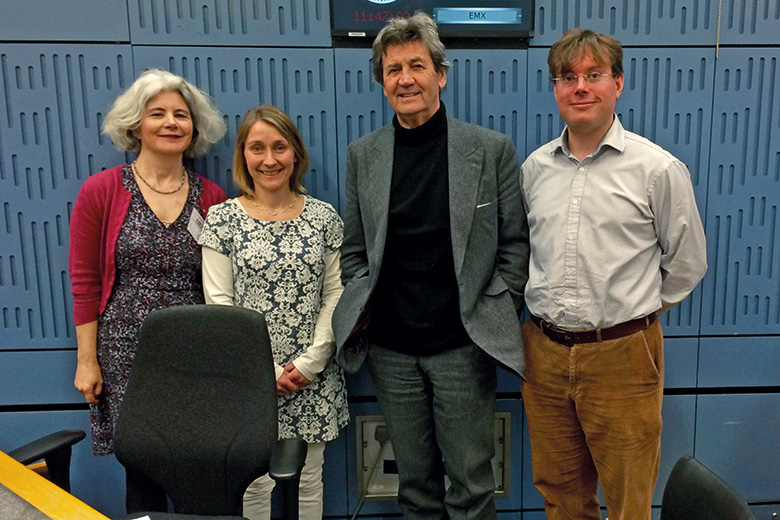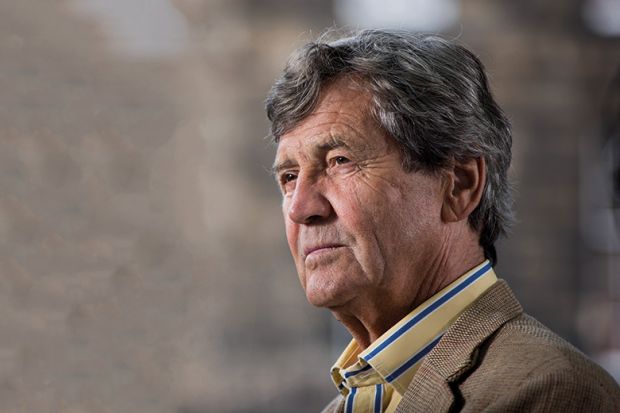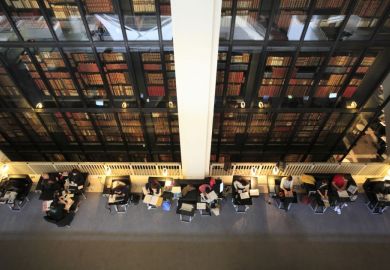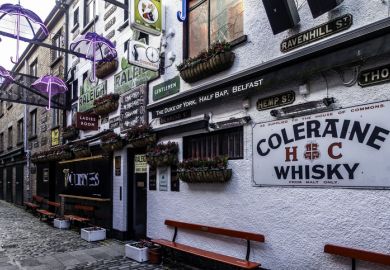It is safe to assume that only a tiny proportion of the British public wake up on a Thursday morning eager to learn about the Abbasid caliphs, the cult of Mithras or computer science’s P versus NP problem.
Yet 2.5 million of them tune in every week to the BBC Radio 4 programme In Our Time to hear septuagenarian presenter Melvyn Bragg quizzing three academic experts on such topics for a dense 45 minutes that is surely the closest the general public ever gets to eavesdropping on an academic seminar.
Those listeners, Bragg tells Times Higher Education, are split between the live morning edition and the shorter, late-evening repeat, and their numbers have been rising year-on-year for the nearly two decades over which the programme has been running (with 42 editions a year). Then there are the 3 million people a month who download the programme, making it “the BBC’s biggest weekly podcast”, according to Bragg.
If someone wanted to challenge the common notion that there is no longer an appetite for serious intellectual discussion in today’s supposedly dumbed-down world, this would be a good case study to cite.
No doubt In Our Time’s popular appeal is boosted by the fact that Bragg is something of a British broadcasting institution. Taken on by the BBC as a trainee shortly after completing a degree in modern history at the University of Oxford in 1961, Bragg was running his own television arts programmes while still in his early twenties.
He admits that he “really did have an agenda” in those early days. “I came from a very strong working-class culture, which was extremely rich,” he says. “We had really good choirs; we had dances; we had reading rooms; we had debates; we went to the movies an awful lot. So we were a rich society. But when I went to Oxford, that was sort of left behind.”
Although grateful for the opportunities that Oxford gave him, Bragg had reservations about an environment that was “a lot more hierarchic” than he was used to, and that espoused cultural assumptions such as that “anything that happens at the Royal Opera House is better than any musical”. He was therefore committed to making arts broadcasting less elitist – but he remembers being “nearly blown out of the room” when he suggested to those running Monitor, the BBC’s landmark television arts show at the time, that they might devote an episode to Elvis Presley.
When Bragg got a chance to create and present his own arts programme, The South Bank Show (on ITV from 1978 to 2010 and then resurrected on Sky Arts in 2012), he made a point of featuring Paul McCartney in the first episode. Subsequent programmes showcased everyone from Dolly Parton to Luciano Pavarotti and even the minimalist composer Steve Reich.
In 1988, Bragg also took over as presenter of the long-running BBC Radio 4 cultural affairs programme Start the Week. There, he was keen to bring in more scientists as guests, in part because he had given up school science at the age of 14 and simply “wanted to learn more”. In his decade on the programme, he claims to have increased the proportion of scientific guests from 1 per cent to 37 per cent.
When Bragg became a Labour Party peer in 1998, the BBC decided that he could not present a programme that sometimes touched on politics. He was, therefore, offered a new show, he recalls, to fill “what they cheerfully called ‘the death slot’ on Thursday morning”.
By this stage, he was fed up with the fact that almost all the guests on Start the Week were plugging a film, a book or an exhibition. So he decided that he “just wanted to talk to academics on one subject and see what happens”. Bragg is firmly of the opinion that television has “lost its nerve” in retreating from serious discussion programmes, because “talking heads can be the most interesting thing in the world”. So, just as The South Bank Show proved innovative in taking popular culture seriously, In Our Time broke new ground by making public and accessible vast tracts of academic research that had previously been confined to the seminar room and specialist journals.

Initially, the programme was given only half an hour, but Bragg found that it often ran out of time just as the conversation was “getting there”. He therefore asked for an extra 15 minutes and “suggested they should do it as a three-acter”. This allows him to start by asking the academic contributors for the basic information needed by “people who know very little indeed”, then to move into a general discussion and finally to consider: “What have we learned and what’s the legacy?”
A few other principles were soon established. In Bragg’s view, live recording creates more “zest”, despite the mistakes and fumbles, and discourages people from “rambling on”. He also makes a point of meeting his guests only a few minutes before they go on air, to ensure that the programme is not “talked away” in advance.
Another golden rule for In Our Time is that, despite the title, the discussion should be “never knowingly relevant”. If an episode is devoted to the ancient civilisations of Iraq, for example, it is emphatically not an opportunity to denounce Tony Blair. And, unlike Bragg’s earlier arts broadcasting, there has been a notable avoidance of popular culture, with episodes already devoted to Hadrian’s Wall, the Haitian Revolution and Hannah Arendt but not, for example, the Hollywood musical or hip hop – despite the range of academic expertise on such themes.
In terms of subjects, Bragg is “up for doing anything”. Even if, in some specialist fields, his “starting point is knowing nothing, by the time I get there on Thursday morning I know enough to ask decent questions”. Although his producers also brief him, Bragg relies largely on the notes that he asks his guests to submit ahead of recording, flagging up “the important things to dwell on”.
Those guests who come over well on air are often invited back. They are also asked to suggest up-and-coming stars in their academic fields who might also make good contributors. If this all sounds a bit haphazard, Bragg is delighted that, “without trying”, the programme has recently achieved “a ridiculously perfect 50 per cent balance between men and women”, with 39 per cent of guests during the past year coming from “universities we had never been to before”.
Although many of Bragg’s contributors had never previously appeared even on local radio, they “soon got the hang of it” because “they knew it was their programme”.
“There are no surprise questions,” he points out. “What’s to worry about? No one’s trying to trip them up or test them. It’s well within their competence. Teaching academics are used to talking to people like me, who don’t know much. Their only job is to get the information over at as good a level as they can, as succinctly as they can manage. Sometimes I say, ‘There’s no rush.’” He also specifically tells them not to “dumb down”.
In the early years of In Our Time, Bragg recalls, “Academics would say, ‘I can’t possibly come on; I’m in my laboratory at 9 o’clock in the morning.’” Now very few turn him down, and many are “really surprised when they get back to their base and emails come in from all over the place, sometimes from all over the world, from friends and colleagues and so on. They like that feedback – and the fact that their students are listening.”
Since the In Our Time archive now includes a back catalogue of nearly 800 episodes, Bragg sees it as “a sort of encyclopedia – often used by [students] writing essays, alongside the proper books [on their reading lists]”. But as well as the feedback he gets from academics and students when he visits universities, he is equally pleased to be stopped in the street or to receive letters saying: “You are giving me an education – I left school at 15.” Even when a programme is devoted to antimatter or the ancient Indian emperor Ashoka the Great, “people think: ‘I’ve stuck with this programme on and off, so I’ll give it a go. I wouldn’t give it a go if I hadn’t enjoyed the past three programmes.’ And sometimes they will say: ‘I didn’t understand a word, but it was interesting.’”
Bragg’s commitment to the inherent value of knowledge and enquiry clearly runs deep. He is a member for the Council for the Defence of British Universities, which campaigns against what it calls the “instrumentalisation of knowledge and its production” and “the privatisation of public educational assets”. And, in January, he spoke out in the House of Lords against the government’s higher education reforms, suggesting that the new Office for Students would amount to a “central control unit” that would be “anathema to freedom, of which [scholars] need more, not less” to “pursue knowledge for the sake of more knowledge”.
While some political figures might rely on anecdotes from their own long-distant university experience when it comes to forming higher education policy, Bragg’s views are informed not only by his regular contact with practising academics but also by his 17 years as chancellor of the University of Leeds. In that role – from which he is soon to retire – he has done “whatever the vice-chancellor asks me to do, dishing out degrees, cultivating alumni, including events in the Lords, chairing court [the board of governors], opening a new library if I’m available. It’s largely ceremonial, but I can sometimes be a direct help.”
Such varied experience of the academy has led Bragg to a number of conclusions. One of those is the high quality of British scholars. When he has chaired events featuring panels of academics in Germany and the US, he has found “they are not as fast and willing to give stuff over, including their latest findings”. Indeed, he suspects that the UK sector is “probably the best in the world per capita. Europe compared to us is nowhere. The [UK] level is very high, and it’s dependent to a great extent on people coming in from overseas.”
All this has left Bragg furious about both Brexit and the government’s refusal to take students out of immigration statistics. He has spoken out several times on such themes in the Lords, and cheerfully reports on a recent panel he took part in alongside Jo Johnson, when the universities and science minister was “good enough to be silent and embarrassed”.
“Universities in this country haven’t become very good overnight or without a lot of effort, a lot of careful bricks being put on top of others,” Bragg reflects. “And somebody has just gone with a bulldozer and said: ‘We’re going to knock this lot down.’ I’m exaggerating, but that’s what it feels like.”
Register to continue
Why register?
- Registration is free and only takes a moment
- Once registered, you can read 3 articles a month
- Sign up for our newsletter
Subscribe
Or subscribe for unlimited access to:
- Unlimited access to news, views, insights & reviews
- Digital editions
- Digital access to THE’s university and college rankings analysis
Already registered or a current subscriber?





